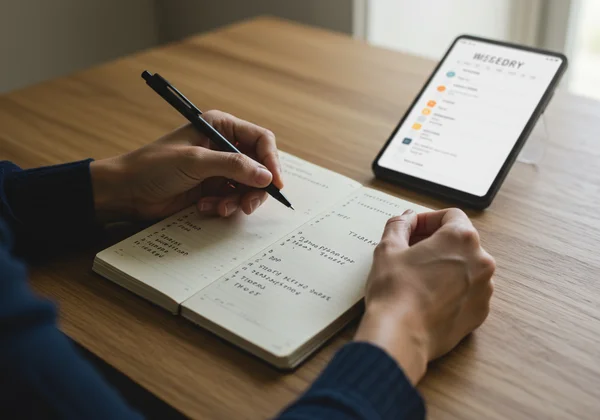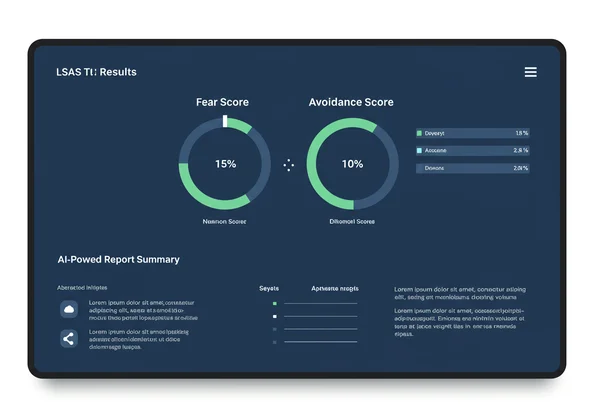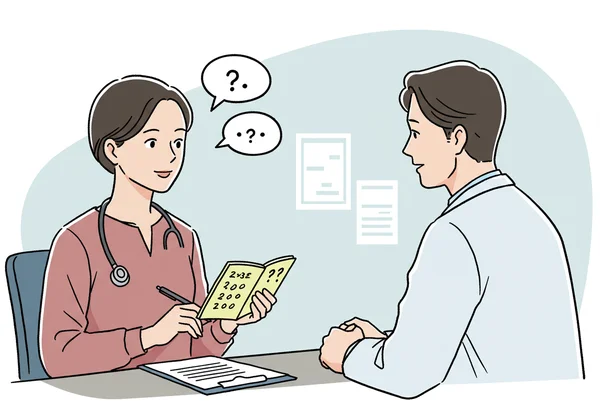Talk to Your Doctor About Social Anxiety: Leveraging Your LSAS Test
September 29, 2025 | By Elara Donovan
Feeling overwhelmed at the thought of discussing your social anxiety with a doctor? You are not alone. The very nature of social anxiety can make seeking help feel like an impossible hurdle. This guide is here to change that. We will walk you through actionable steps to prepare for your appointment, making the process feel structured and manageable. By the end, you'll see how using a tool like our quick LSAS online test can transform your conversation, giving you a clear, objective starting point. It’s time to demystify the process and empower you to talk to your doctor about social anxiety with confidence.

Preparing for Your Mental Health Appointment
Preparation is the key to turning anxiety into agency. Walking into your appointment with organized thoughts can significantly reduce stress and lead to a more productive conversation. It helps your doctor understand the full picture and ensures you don't leave feeling like you forgot something important. This is your first step toward gaining clarity and support.
Understanding Your "Why": Why Seek Professional Help?
Before you document your symptoms, take a moment to connect with your motivation. Why are you seeking help now? Perhaps social anxiety is affecting your career, preventing you from making friends, or causing significant daily distress. Acknowledging the impact it has on your life validates your decision to seek support and provides a powerful "why" to hold onto. Seeking professional help for anxiety is not a sign of weakness; it's an act of strength and self-care. It opens the door to evidence-based treatments and strategies that can fundamentally improve your quality of life. A professional can offer a formal diagnosis, create a personalized treatment plan, and provide the guidance you need to navigate your challenges.
Gathering Your Thoughts: What to Document Beforehand
The mind can go blank under pressure. To avoid this, spend some time before your appointment gathering your thoughts. One of the best doctor's appointment tips is to write everything down. Create a simple document or use a notebook to jot down key information.

Consider these points:
- Specific Situations: List the social scenarios that trigger your anxiety. Is it public speaking, meeting new people, eating in front of others, or making phone calls? Be as specific as possible.
- Symptoms: Note how you feel physically (e.g., racing heart, sweating, trembling, blushing), emotionally (e.g., intense fear, dread, embarrassment), and cognitively (e.g., negative self-talk, fear of judgment).
- Frequency and Intensity: How often do you experience these feelings? On a scale of 1 to 10, how intense is the anxiety in those moments?
- Avoidance Behaviors: What do you do to avoid these situations? Have you turned down promotions, skipped social events, or avoided certain classes?
- Impact on Daily Life: How has this affected your work, education, relationships, and overall well-being?
This preparation gives you a script to rely on, ensuring your concerns are communicated clearly and effectively. For a structured starting point, you can take the assessment on our site.
Discussing Social Anxiety with Your Doctor
With your notes in hand, you are ready for the appointment itself. Remember, your doctor is a trained professional who is there to help, not to judge. They have these conversations regularly. Your honesty and preparation will make their job easier and your visit more successful. The goal of discussing social anxiety with your doctor is to form a partnership in your health journey.
Breaking the Ice: How to Start the Conversation
Starting the mental health conversation is often the hardest part. You don't need a perfect opening line. A simple, direct statement is highly effective. Try one of these:
- "I've been struggling with what I think might be social anxiety, and I'd like to talk about it."
- "I've been feeling extremely anxious in social situations, and it's starting to impact my life."
- "I took an online screening tool for social anxiety, and the results concerned me. Could we discuss them?"
Saying these words out loud can feel liberating. It signals to your doctor exactly what you need to address and sets a clear agenda for the appointment.
Leveraging Your LSAS Test Results: Score and AI Report
This is where your preparation truly shines. Instead of just describing vague feelings of anxiety, you can present concrete data. Your LSAS test results provide a powerful, objective foundation for your conversation. The Liebowitz Social Anxiety Scale (LSAS) is a respected clinical tool, and sharing your score gives your doctor a standardized measure of your symptoms.

Explain your score in terms of its components: the Fear score and the Avoidance score. This helps illustrate not just what you're afraid of, but what you actively do to avoid that fear. For even deeper LSAS score interpretation, consider opting for our unique AI-powered report. You can tell your doctor: "I also have a detailed report that identified my specific triggers, challenges, and personal strengths." This AI analysis goes beyond a simple number, offering personalized insights that can kickstart a highly specific and productive discussion about what truly affects you. It's a unique way to get your report and bring personalized data to your appointment.
What to Share: Key Symptoms and Daily Impact
Use the notes you prepared to elaborate on your LSAS results. Talk through the specific social anxiety symptoms you documented. Describe the physical sensations, the racing thoughts, and the overwhelming fear of judgment. Most importantly, connect these symptoms to their real-world consequences.
Explain how avoiding social situations has limited your life. Did you miss a friend's wedding? Do you struggle to participate in work meetings? Does the fear of scrutiny prevent you from pursuing your hobbies? Sharing the daily impact of your anxiety helps your doctor understand the severity of the issue and the urgency for intervention. This narrative context, combined with your LSAS score, creates a comprehensive and compelling picture of your experience.
Questions to Ask Your Doctor and What to Expect Next
A medical appointment is a two-way street. Asking questions empowers you to be an active participant in your healthcare. It ensures you leave with a clear understanding of your situation and the path forward.
Asking the Right Questions About Social Anxiety Treatment
Come prepared with a list of questions. This shows you are engaged and invested in your well-being. It also helps you gather the information you need to make informed decisions about your social anxiety treatment.
Here are some great questions to ask:
- Based on what I've shared, do you think I might have social anxiety disorder?
- What are the next steps for getting a formal diagnosis?
- What treatment options do you recommend? (e.g., therapy, medication, lifestyle changes)
- Could you explain the difference between Cognitive Behavioral Therapy (CBT) and other types of therapy?
- What are the potential benefits and side effects of any proposed medication?
- Can you refer me to a mental health specialist, like a therapist or psychiatrist?
- Are there any resources or support groups you would recommend?
Understanding Potential Next Steps and Referrals
After your discussion, your doctor will outline potential next steps. This may include a formal social phobia diagnosis, which often involves a more in-depth clinical interview. It's important to understand that a tool like the LSAS test is for screening and assessment, not diagnosis.
Your doctor might refer you to a mental health professional who specializes in anxiety disorders. This is a positive step, as specialists can provide targeted therapies like CBT, which is considered the gold standard for social anxiety. They might also discuss medication options if your symptoms are severe. Whatever the plan, the goal is to create a support system that equips you with the tools to manage social anxiety and reclaim your life. This first conversation is the gateway to that supportive care.

Discussing social anxiety with a doctor takes courage, but it's a vital step toward reclaiming your life. By preparing your thoughts, asking informed questions, and leveraging objective data from an assessment, you can transform a daunting appointment into an empowering conversation. Understanding your social comfort is the key to managing it. You have the power to initiate this change. Take the first step today and use our self-assessment tool to build the confidence for a productive dialogue with your doctor.
Frequently Asked Questions About Discussing Social Anxiety
What should I tell my doctor about my LSAS score?
You should present your LSAS score as a helpful starting point. Explain that it's from a scientifically-backed self-assessment you took to better understand your feelings. Mention your total score and, if possible, the breakdown between your "Fear" and "Avoidance" subscores. This can highlight whether your primary struggle is the internal feeling of fear or the external act of avoiding situations.
Can a doctor diagnose social anxiety just from an LSAS test?
No, and this is a critical point. While the LSAS is a valuable and respected clinical tool, it is a screening measure, not a diagnostic instrument. A formal diagnosis can only be made by a qualified healthcare professional after a comprehensive clinical evaluation. Think of our self-assessment tool as the conversation starter, not the final conclusion.
What if I feel too anxious to talk to my doctor during the appointment?
This is a very common and valid fear. If this happens, you can rely on your preparation. Hand your doctor the notes you wrote beforehand. You can even say, "I'm feeling very anxious talking about this, but I wrote everything down here." Showing them your printed LSAS results or the AI report can also do the talking for you, providing a clear and structured summary of your challenges.
What questions might a doctor ask about my social anxiety?
A doctor will likely ask questions to get a clearer picture of your experience. Be prepared for questions like: "When did you first start feeling this way?", "Can you give me a specific example of a situation that made you anxious?", "How does this anxiety interfere with your daily life, work, or relationships?", and "Have you ever had a panic attack?". Answering these honestly helps them understand your situation fully.